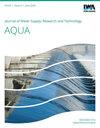Application of a hybrid ANFIS with metaheuristic algorithms to estimate the aeration design parameters
IF 4.3
Q2 Environmental Science
引用次数: 0
Abstract
Cavitation is a common and complex hydraulic phenomenon on the chute spillways and may cause damage to the structure. Aeration in the water flow is one of the best ways to prevent cavitation. To design an aerator, estimation of aeration coefficient (β), jet length (L/h0), and jet impact angle on chute (tanγ) are important in this study. The potential of a hybrid Adaptive Neuro-Fuzzy Interface System (ANFIS) with metaheuristic algorithms was investigated to estimate the required parameters to design an aerator. The ANFIS was combined with four metaheuristic algorithms, including Differential Evolution (DE), Ant Colony Optimization (ACO), Genetic Algorithm (GA), and Particle Swarm Optimization (PSO). Experimental data and dimensionless parameters were used to develop the proposed hybrid ANFIS models. Three statistical indicators, including Root Mean Square Error (RMSE), Mean Average Error (MAE), and coefficient of determination (R2), were employed to compare the proposed methods with empirical relations. According to the statistical indicators, among the data-driven methods, the ANFIS–DE method had the best prediction in estimating β (RMSE = 0.018, R2 = 0.984, MAE = 0.013), L/h0 (RMSE = 1.293, R2 = 0.963, MAE = 1.082), and tanγ (RMSE = 0.009, R2 = 0.939, MAE = 0.007).混合ANFIS与元启发式算法在曝气设计参数估计中的应用
空化现象是溜槽溢洪道上一种常见而复杂的水力现象,可能对结构造成破坏。在水流中加气是防止气蚀的最好方法之一。在设计曝气器时,曝气系数(β)、射流长度(L/h0)和射流对溜槽的冲击角(tanγ)的估计是重要的。研究了一种混合自适应神经模糊界面系统(ANFIS)采用元启发式算法估计曝气器设计所需参数的潜力。该算法与差分进化(DE)、蚁群优化(ACO)、遗传算法(GA)和粒子群优化(PSO)四种元启发式算法相结合。利用实验数据和无量纲参数建立了混合ANFIS模型。采用均方根误差(RMSE)、平均误差(MAE)和决定系数(R2) 3个统计指标,将所提出的方法与经验关系进行比较。从统计指标来看,在数据驱动的方法中,anfiss - de法对β (RMSE = 0.018, R2 = 0.984, MAE = 0.013)、L/h0 (RMSE = 1.293, R2 = 0.963, MAE = 1.082)和tanγ (RMSE = 0.009, R2 = 0.939, MAE = 0.007)的预测效果最好。
本文章由计算机程序翻译,如有差异,请以英文原文为准。
求助全文
约1分钟内获得全文
求助全文
来源期刊
CiteScore
4.70
自引率
0.00%
发文量
74
审稿时长
4.5 months
期刊介绍:
Journal of Water Supply: Research and Technology - Aqua publishes peer-reviewed scientific & technical, review, and practical/ operational papers dealing with research and development in water supply technology and management, including economics, training and public relations on a national and international level.

 求助内容:
求助内容: 应助结果提醒方式:
应助结果提醒方式:


